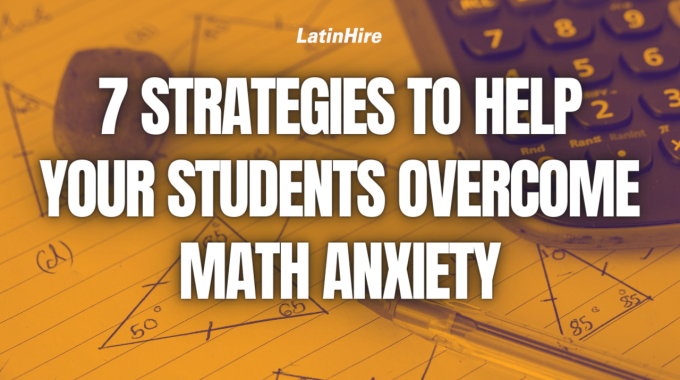In last week’s article, we looked at introducing quantum numbers using a condo analogy as…

7 Strategies to Help Your Students Overcome Math Anxiety
Math anxiety is a common issue that many students face, both in traditional classrooms and in online educational settings. The fear of math stems from various sources, such as a lack of confidence in one’s abilities or a fear of being judged for not producing answers fast enough. Regardless of the reason, math anxiety can hinder a student’s ability to learn and succeed in this vital subject area.
As educators, whether in-person or online, it’s crucial to recognize the signs of math anxiety early on and implement appropriate strategies to help students overcome it. By creating a supportive and nurturing learning environment, we can empower students to develop confidence in their mathematical skills, paving the way for academic accomplishments and future success beyond the classroom.
Understanding Math Anxiety

Math anxiety is more than just a dislike for math; it’s a psychological condition that can show up as feelings of fear, frustration, and inadequacy when faced with mathematical tasks. This anxiety often stems from negative experiences with failure. In math, there’s always a right or wrong answer, which can get kids fixated on their failures when they get answers wrong and they take this as an indication that they’re not good at math.
Early childhood experiences also play a significant role in the development of math anxiety later on. While many parents read with their children from a young age, very few engage in solving math problems with them. Often, a child’s first exposure to math is when they begin school. And even before starting school, many children may already have been exposed to societal stereotypes that math is difficult or girls aren’t good at math.
Recognizing the Signs

Here are some signs that may indicate that a student has math anxiety:
1) Avoidance of math-related tasks or assignments.
2) Procrastination or lack of engagement in math lessons.
3) Freezing up during a math test.
4) Physical symptoms such as sweating, trembling, or rapid heartbeat when confronted with math problems.
5) Negative self-talk or low self-esteem regarding mathematical abilities.
6) Difficulty concentrating or retaining information during math lessons.
By recognizing the signs early, you can take action to help your students overcome their math anxiety and thrive academically.
Strategies for Overcome Math Anxiety

There are several effective strategies that educators can implement to help students overcome math anxiety and develop a positive attitude towards math:
1) Foster a Positive Learning Environment:
- Create a supportive and inclusive online classroom where students feel comfortable expressing their thoughts and asking questions.
- Encourage a growth mindset by emphasizing that intelligence and mathematical ability can be developed through effort and practice.
2) Break Tasks into Manageable Steps:
- Break down complex math problems into smaller, more manageable steps to prevent students from feeling overwhelmed.
- Provide scaffolded support and guidance throughout the learning process, gradually increasing the level of difficulty as students gain confidence.
3) Use Interactive and Engaging Resources:
- Incorporate multimedia resources, such as videos, interactive simulations, math manipulatives, and educational games to make math more engaging and accessible.
- Offer opportunities for hands-on learning experiences that allow students to apply mathematical concepts in real-world contexts.
4) Provide Timely and Constructive Feedback:
- Offer timely feedback on students’ mathematical work, focusing on both their strengths and areas for improvement.
- Encourage students to view mistakes as valuable learning opportunities rather than failures.
5) Use Real-World Applications:
- Show students how math is not confined to the classroom, but is an important part of everyday life, such as using money, cooking, or counting LEGO pieces.
- By illustrating the practical side of math, students may appreciate the subject more.
6) Teach Students Test Preparation Strategies:
- Encourage students to summarize their learnings by creating cheat sheets with key formulas, concepts, and problem-solving strategies before taking a math test.
- Help students organize their thoughts by reproducing the materials that they learned.
7) Encourage Peer Collaboration and Support:
- Facilitate peer collaboration and discussion forums where students can share strategies, ask questions, and support one another in their mathematical learning journey.
- Pair students with varying levels of mathematical proficiency so they can help one another, and problem-solve collectively.
Some strategies will be more effective for certain students than others, so by implementing a combination of these techniques, you can better help your students overcome math anxiety and develop the confidence and skills to succeed in their math studies. When you foster a growth mindset among your students and provide personalized support, you can empower them to embrace math as an exciting and rewarding subject.
Have you ever worked with students who have math anxiety? What strategies did you use to help them overcome it? Share them in the comments below!



